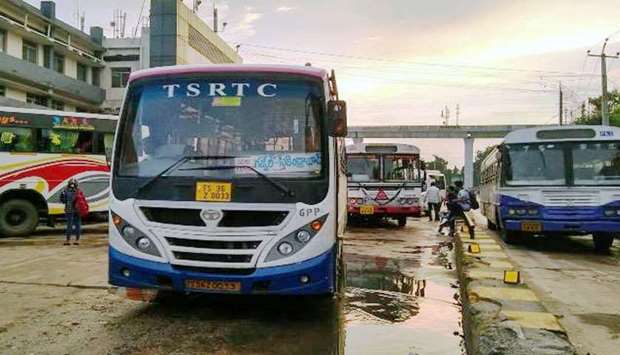India's southern state of Telangana has sacked more than 48,000 employees from the regional bus department over an indefinite strike, officials and news reports said on Monday.
The striking workers of Telangana State Road Transport Corporation had refused to end their two-day protest by the government deadline on Saturday, after which authorities announced the decision late Sunday night.
State chief minister K Chandrashekar Rao ruled out any negotiations with the striking workers - mainly bus drivers and conductors - to reinstate them and had made fresh recruitments.
‘It is an unpardonable crime that they went on a strike during the festive season and at a time when the road corporation is incurring huge losses and an increasing debt burden,’ Rao said, according to broadcaster NDTV.
In recent days, millions of Indians are returning home to visit relatives and celebrate the Hindu festival of Dussehra, which falls on Tuesday.
Senior state official K Ramakrishna Rao confirmed that authorities had taken action by invoking provisions of the Essential Services Maintenance Act (ESMA), which rendered the strike illegal.
‘Under ESMA provisions, if the conduct of employees is illegal, they are liable for dismissal from service,’ he said.
Around 50,000 workers had gone on strike on Friday with 26 demands, including releasing dues and a merger of the corporation with the government. Over 1,200 had not joined the strike.
The transport department had already recruited 5,400 drivers and bus conductors for its 10,400 buses, 60 per cent of which were operational on Monday, according to transport officials.
One of India's main trade unions, the Centre of Indian Trade Unions, described it as an ‘authoritarian’ move to suppress the strike and demanded the immediate reinstatement of the dismissed employees.
Legal experts were divided over the controversial move, saying it was not tenable in court. Government officials maintain that under Indian law, essential services include public transport, power and water supplies, and the sackings were valid.
This is not the first time authorities in India have resorted to mass sackings. In 2003, Jayaram Jayalalithaa, then chief minister of the southern state of Tamil Nadu, dismissed over 170,000 state employees and teachers after they went on strike.
Although she reinstated their jobs, the move came at a heavy political cost as she later lost the state elections.

